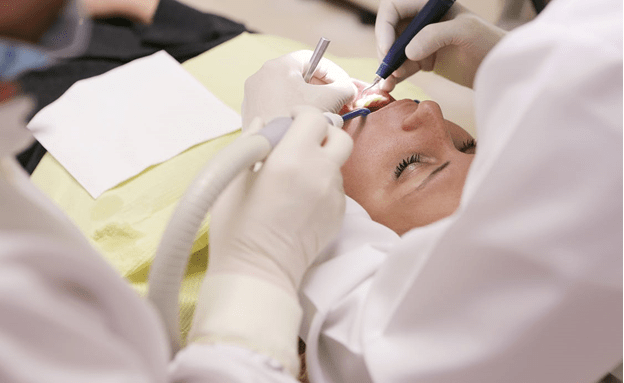
There are a lot of questions most people have about getting dentures. How much will they cost? What kind of glue should you use? What can you eat with them? And can you get them in your area? You need to know exactly what you’re getting into, and you need to know it before you begin. I’m not an expert, but hopefully I can help answer at least some of those questions.
Cost of Dentures
The price of a set of dentures can fluctuate wildly. One variable is the dental appointments themselves, but that varies so much depending on location and insurance that I can’t possibly estimate.
The dentures also run a wide range of price. Cheaper sets can still be around a thousand dollars, and I’ve heard of good ones costing between eight and fifteen thousand. Be prepared to spend as much as you would on a small car.
The main reason the price changes so much is because the quality fluctuates so much. The best dentures are acrylic, which has several properties that are similar to real teeth. Lower-cost, lower-quality dentures are made of less expensive plastics.
What to Do With Dentures
Denture care is both simple and complex. The surface level is fairly simple: put them in every morning, take them out every night. There’s a lot to be done between night and morning, though.
You can find solutions designed to soak your dentures in overnight. These clean them and kill bacteria. You should also brush your dentures once a day, either inside your mouth or outside. Brush your gums when you take them out, too, and swish some mouthwash.

How to Choose a Glue
The glue that holds your dentures in place is one of the most important factors. Some people can get away without any, but many people find glue necessary. It’s important to look at a lot of different factors before you choose, and you might have to try several different types before you find the one that works for you.
Some glues contain zinc, which is somewhat dangerous to eat. The risks aren’t too bad for small amounts. If you’re still concerned about it, try to find a zinc-free brand.
Others may need organic formulas, if they have sensitive skin. Some chemicals found in glues can irritate skin. These organic brands will almost certainly be more expensive, but the increased comfort is probably worth it.
A cream formulation can be soothing, and smooth over some of the pain of poorly-fitting temporary dentures. If you’re just looking for the easiest thing to use, adhesive strips will be better than anything else.

Food to Eat With Dentures
Your dentist will probably put you on a liquid diet to begin with, and then only soft foods after that. But eventually, you’ll learn how and what to eat with dentures, and you’ll start to be more comfortable with them.
The first two weeks are the most difficult part. Doctors usually recommend you only eat liquids and extremely soft foods during this period. For protein, you can look to yogurt and broth. Soft cheeses may also be allowed. You can probably eat mashed potatoes as well, and they’re likely to be the most filling food you’re allowed. Smoothies will also be helpful, to help you get fruit and vegetables.
After two weeks, you get a little more variety, but not very much. It’s still recommended to be very careful for two weeks longer. Baked potatoes and bread are on the list. Pasta is as well, but only if it’s very well-cooked. Meat may be okay, as long as it’s cut very small.
By the end of the month, you may be able to eat more difficult foods. Solid pieces of meat should be fine, along with crispy fries and solid chunks of cantaloupe. You may even be able to handle extremely difficult foods, like corn-on-the-cob, or entire uncut apples. Whether or not this is possible can vary from person to person, though, so be careful.
Length of the Process
Most dental companies offer a system called “teeth in a day,” but the name is very misleading. The first day only gives you a temporary set made of poor-quality plastic, and many of them don’t fit right.
You may have to go back to the same office five or ten times, getting your temps updated and refit, which will add to the cost. And the temps are also usually extremely uncomfortable. It may be ten months—or even more—before the permanent set of dentures is ready.
Only one local business that I’m aware of uses a model different than the usual teeth-in-a-day method. Nuvia, at https://www.nuviasmiles.com/locations/dental-implants-marietta-georgia, doesn’t prepare your teeth for dentures until your permanent set is already ready for you—no ten months of temps. That should also get you onto a more solid diet a little faster. They’re a little outside Marietta, down 120 and just past the cemetery.

Conclusion
There’s a lot of questions swirling around about dentures. They seem like such a big step, kind of scary. But, like every field, they’re advancing dramatically. The world is different than it was when we were growing up, and our old age doesn’t have to be like our parents’ and grandparents’ was.
Many variables and many questions arise from this decision. It’s a really important one, and you want to make sure you get every detail right, from cost to comfort to food to time. Consider everything before you commit to anything; you can’t easily undo the choices you make.
It’s not just doom and gloom and extreme caution, though. You’ll find that you feel so much better when your smile looks good. You can enjoy more and feel more confident in the way you look! You’ll feel freer to enjoy the little things, and without worrying about whether your smile looks crooked or people can see your missing teeth, you’ll grin bigger, laugh louder, and enjoy yourself more.
